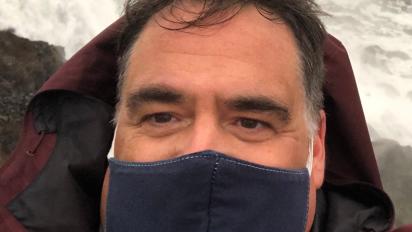Random Samples with Don Haas

Don Haas has had a long and distinguished career working with science educators to ensure that climate change is taught accurately and effectively. Currently the Director of Teacher Programming at the Paleontological Research Institution (a 2019 winner of NCSE’s Friend of the Planet award), Haas began his career in education as a high school science teacher and is a past president of the National Association of Geoscience Teachers. He is co-author of the books The Teacher-Friendly Guide to Climate Change (2017) and The Science Beneath the Surface: A Very Short Guide to the Marcellus Shale (2013) and a past contributor to RNCSE.
Paul Oh: Tell me about your work at the Paleontological Research Institution.
Don Haas: I like to describe my job as helping educators kick butt in their teaching, and helping learners under-stand the nature of Earth’s systems. My colleagues and I provide teacher development programming, which I help coordinate with an awesome team. Now, because of the pandemic, we do that online. We develop resources to help educators of all sorts, and also to help the general public, better understand the nature of the history of Earth and its systems, and how those two pieces play together. That includes contributing to books and curriculum materials and developing labs and working on exhibit development. Though I don’t take the lead on any of that, I participate a fair amount. I’ve been at PRI full time since 2008. But I did some grant work with PRI in 2005 when I was a professor of science and math education at Colgate University and then when I was visiting faculty at Cornell from 2001 to 2003. So I’ve been connected with PRI for a bunch of years. And the whole time I’ve been involved, I’ve seen a growing role for climate education. PRI now has a dedicated Climate Team. That’s me, Rob Ross, Ingrid Zabel, and Alexandra Moore. Most of what I’ll talk about here is the work of all of us.
PO: You were instrumental in the creation of the freely available The Teacher-Friendly Guide to Climate Change. Can you tell me how that project originated?
DH: It was funded as part of the outreach for a major National Science Foundation climate science grant at Cornell University. PRI was the outreach partner on that grant, and our work involved writing the book and developing an exhibit on the carbon cycle. It’s the 10th in the series of teacher-friendly guides. We have seven regional earth science guides for the US. And there are two teacher-friendly guides to evolution that use non-threatening—non-human—organisms to teach evolution. All were written with funding from NSF and all are free on our website.
PO: What were you hoping to accomplish with The Teacher-Friendly Guide to Climate Change?
DH: We’re trying to provide one clear resource for a good overview of the basic science of climate change that’s accessible to teachers and also understandable to students. So that’s one big piece of what we’re hoping to accomplish—building knowledge among educators about climate change and energy science. We are also trying to help teachers navigate some of the political contentiousness related to treating climate change as a real and serious threat that’s caused by humans. Understanding how to navigate the social and cultural and psychological issues that surround teaching climate change and energy is critical. Ingrid Zabel, I should mention, was the lead author of The Teacher-Friendly Guide to Climate Change. I wrote the chapters that are more social science-ish in orientation, which get at the reasons why there are different challenges for teaching earth science than photosynthesis, for example.
We at PRI are driven to make the world a better place. We think that understanding Earth's systems allows learners to recognize that human use of energy and other things that humans do, especially our energy-use choices, are changing the world in scary ways. And we want to help people both understand the nature of climate change and energy systems and understand what role we play in the changing of the climate and what we can do to respond to these changes and to hopefully minimize future bad changes. That’s a pretty lofty goal, but hopefully we’re making a dent.
PO: You’ve spent some effort trying to send The Teacher-Friendly Guide to Climate Change out to teachers.
DH: Just as we were about to go to press in the spring of 2017, the Heartland Institute hit the news with what I regard as propaganda—a booklet called “Why Scientists Disagree About Global Warming”—which was sent to every science teacher in the country. And we said to ourselves, “Oh my god, we have to address that in the book.” So we added an FAQ section refuting the Heartland Institute’s reports. We looked at the claim that this booklet was shipped to 200,000 science teachers and said, “We need to do that too.” We do not have the deep pockets of the Heartland Institute, so we launched a crowdfunding campaign and succeeded in getting our book into 15 states before the pandemic shut us down. We’re still hoping to get it into all 50 states.
PO: How do you see the work of NCSE supporting what you’re doing with teachers?
DH: I think NCSE is a great organization and has really pretty similar goals to PRI. We’ve known each other for more than my whole time at PRI. Along with our climate change work, we’ve always focused on helping people understand evolution. We have a big Darwin Day celebration every February, for instance. NCSE helps get the word out about our work, which helps us extend our reach. And we were absolutely delighted to be a Friend of the Planet awardee last year. I should add that [NCSE Deputy Director] Glenn Branch is a member of the advisory board for the Climate Change Education Research Conference that PRI was to host physically in August of this year and which will now be online in January 2021. That’s just one of many examples of ways our organizations support one another.
This article has been modified slightly from its original print format.





